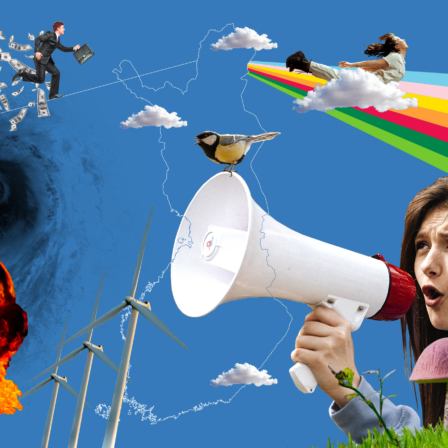When I began studying sociology and political science way back in the 1980s, one of my first textbooks was Der Sicherheitsstaat (The Security State) by the German author Joachim Hirsch (and published in Finnish as Turvavaltio in 1983). What I remember most about that book was that, according to Hirsch, our modern society has been “thoroughly capitalised”. He meant that commodification has increasingly become a part of social relations, so that nearly all our social relations in today’s society are mediated and expressed through objects (commodities and money). The university world was concerned about this in the 1980s.
The concept of commodity mediation is a direct reference to the ideas about commodity fetishism presented by Marx in Capital. In the chain of events described by Marx, people buying commodities focus on the exchange value rather than their real value, which is based on the work effort used to produce the commodities.
Thus, thorough capitalisation of the entire society simply means that everything is measured in money, or ‘exchange value’ in the language of Marx. According to many left-wing thinkers, the result of this is alienation, and more specifically, people becoming alienated from their own work. They also believe that real values, such as beauty, truth, freedom, fairness and equality, are very much left in the shadow of monetary values when everything moves into the sphere of the market economy.
The triumphant march of thorough capitalisation
Until recently, the concept of thorough capitalisation has been mainly used by left-wing thinkers. They believe that the world is undergoing a vast process of thorough capitalisation of the entire society, a global revolution in market fundamentalism. It began as colonialism, after which more and more new parts of life, products and areas of humanity have entered the sphere of capitalism.
The revolution has been promoted by, for example, an administration ideology that emphasises competition, outsourcing public administration tasks, internal marketing of tasks, and profit and cost accountability for administration, research, teaching and public services. Key arguments include saving money and increased efficiency and competitiveness. Common and shared property has also gradually become private owned. For example, common natural resources like sources of oil and fresh water have been privatised. Even the diversity of nature has come within the sphere of capitalism, because modified and refined plant species can be patented in certain cases.
Examples of widely conceptualised thorough capitalisation or marketisation are also fairly easy to find in Finland if one chooses that kind of standpoint. To a certain extent, the social welfare and health care reform represents a move in this direction. Certain services that were previously based only on public money are now partly financed by advertising or sponsors. This is how funds have been obtained for art museums and for university and hospital construction projects, and shared-use city bikes have been procured in Helsinki in the same manner.
“Marketisation” affects more and more people
The rise of the entire sharing economy can also be seen as a sign of thorough capitalisation. Many things that were formerly shared free of charge now have a price in the new sharing economy:
I used to lend my car to friends who didn’t have one without much thought whenever they asked. As my awareness of the sharing economy increased, I wanted to register my car on the lists of a company that organises sharing so that my friends could pay a fair price for borrowing the car. However, my car was too old to get on the lists, so I continued with the old system.
Hitch-hikers nearly disappeared from road sides at the same time as the use of fee-based ridesharing began growing. Like many other activities in the sharing economy, the Internet and platforms operating there have enabled an increase in ridesharing. Online platforms like Uber also turned every car owner into a potential provider of taxi services. In the same way, room-letting websites like Airbnb make every home owner a potential provider of accommodation services.
Huge peer-to-peer trading markets are also developing in addition to traditional flea markets. Although the examples mentioned above are voluntary by nature, the sharing economy has turned many of us into potential small entrepreneurs. Marketisation thus affects an increasing number of people.
Breaking free of the ownership obligation
Is thorough capitalisation of the entire society always negative? For example, the sharing economy has, in practice, empowered many people. It has created a sort of additional safety net for many people without employment or who, for one reason or another, are dependent on part-time work. If an unemployed person owns a home or car, the sharing economy makes it easy to obtain additional income from this property. Some people have even found full-time employment via sharing economy platforms that provide temporary job placements.
Digitalisation and robotisation are dramatically changing working life, and sharing economy mechanisms can provide an alternative and, in the best case, more meaningful way of finding employment. In this respect, there are also positive elements associated with thorough capitalisation. Of course, the so-called ‘gig economy’ also involves social risks, one of which is polarisation in the labour market. Alleviating such risks should be an important focus for labour market operators and lawmakers. It would be unfortunate if decision-makers ignored the inevitable changes in working life and the economy and subsequently failed to reform regulations to tackle the issues caused by the new circumstances.
However, things like breaking free of the ownership obligation and increased appreciation for access rights that are part of the sharing economy, provide consumers with opportunities that traditional critics of thorough capitalisation also might consider desirable.
For example, a poor Helsinki resident who wants to cycle doesn’t have to buy a bike in the summer because a small investment gives him or her the right to use a good-quality city bike. One can also include the practice of libraries maintained by tax money lending ice skates, headphones, blood pressure meters and other everyday items to be a part of the sharing economy in Helsinki. A few libraries also serve as a physical platform for the Kuinoma online service for peer-to-peer lending of recreational equipment.
The more humane side of thorough capitalisation
The sharing economy can also promote the sense of community. Various food circles have increased social contact for many people. The more sharing economy platforms begin to offer services in addition to commodities, the more they also change ways of handling practical matters. For example, when a new cleaning need appeared, the solution used to be either buying cleaning supplies and doing the job yourself or hiring a cleaner and probably negotiating at length with a cleaning company in order to do so. Today, more and more people can order cleaning services for a specific need with a few clicks on a website and then pay for it online with money or, for example, by means of a service exchange with a time banking service. These kind of convenient services might make the economy more dynamic and can, at least in theory, provide the foundation for increasing sociality.
The sharing economy, especially its community or co-operative element, has made people even stronger spontaneous economic players. This can highlight the social and humane side of thorough capitalisation. Self-produced services, such as peer-to-peer car sharing or local cultivation and home delivery of organic products, are an alternative to similar services provided by large, faceless companies, such as renting a car from a car rental giant or buying intensively-farmed products from supermarket chains. Although the new economic activities going on in peoples’ own close circle is certainly market-based – for example, locally farmed products are paid for with real money – this simultaneously replaces faceless activity that is just as market-based. Perhaps this development is not quite as dangerous as some people think. It may actually cause less, rather than more alienation.
Clearer legislation is needed
The sharing and platform economy will inevitably change the entire economy. Some people on the political left have also already recognised this fact. For example, in a bulletin on 5 February 2016, the Member of Parliament for the Left Alliance, Anna Kontula, wrote about how student housing residents have recently discovered the opportunity to earn extra money by renting their apartments to tourists via the Airbnb online service. Kontula was disappointed that “once the activity became public, the student housing foundations that own the buildings had to ban sub-letting because of the regulations associated with subsidised living”.
Clear and up-to-date legislation would prevent conflicts and safeguard the rights of various sharing economy operators.
According to Kontula, this case was another reminder of the need to update legislation: “For students, this is not professional or regular activity, but the opportunity for people on a small budget to finance their lives and studies by means of occasional income, for example, when spending a weekend at home. Rather than condemning such activity, people should understand the opportunities that it presents.” Clear and up-to-date legislation would prevent conflicts and safeguard the rights of various sharing economy operators. Taxation is also easier when the rules are clear.
More efficient use of idle resources is one of the greatest sharing economy promises for people and the environment.
In recent years, ordinary people have improved the utilisation rate for existing resources by trading more with each other. More efficient use of idle resources, goods, space, skills or, for example, cars, is one of the greatest promises of the sharing economy in terms of the well-being of people and the environment.
People have always shared and sold things to each other, but new communication technologies have accelerated the phenomenon to an unprecedented pace. For example, the cash flow in Finnish peer-to-peer online trade already exceeds Finnish consumption in Estonia. If domestic peer-to-peer online trade continues to grow at the same rate, it’s expected to surpass the volume of sales at traditional bricks-and-mortar stores in less than 10 years. Many large brands have recognised this phenomenon and are considering their role in the second-hand market. It is also clear that knowledge and competence sharing in peer-to-peer networks is one of the cornerstones of the modern information society.
The power of the sharing economy: encounters that are economically and socially valuable
Sharing in all its forms is now more popular than before. Sharing is also seen as strengthening the perception of personal abilities and possibilities. For some people, sharing is also a means of survival.
“Various sharing economies have developed in residential neighbourhoods, playgrounds and dog parks or local pubs, providing a place to exchange services, information and skills, such as dish washing for breadline visits and employment and recreational tips,” write Anna-Maria Isola, Elina Turunen and Heikki Hiilamo in their article “How do the poor in Finland deal with poverty?” (Yhteiskuntapolitiikka 2/2016).
The sharing economy has allowed people to simultaneously earn money and have new social encounters.
The power of the sharing economy is based on the fact that, in the best case, it has allowed people to simultaneously earn money and have new social encounters. These are mutually reinforcing motivating factors. Sharing economy researcher Airi Lampinen has stated that handling payments “invisibly” via an online platform reinforces positive experiences of sociality. Making a payment via a service eliminates the need to talk about money face to face and there is no risk of the other party failing to handle their part of the deal. This makes it easier to emphasise hospitality or a sense of community during any face-to-face contact. Thus, a clear transaction guaranteed by a platform service can also facilitate social interaction, which is valuable not only economically, but also in other ways.
When discussing thorough capitalisation of the entire society, another term should also be used: thorough socialisation of the entire economy.
It creates a kind of positive cycle. Positive experiences lead to an increase in the use of sharing services, which further socialises the economy. Good experiences obtained from a single service or form of participation can encourage more extensive and diverse participation. This changes the entire economy. When discussing thorough capitalisation of the entire society, another term should also be used: thorough socialisation of the entire economy.
























Other articles
Share these too.